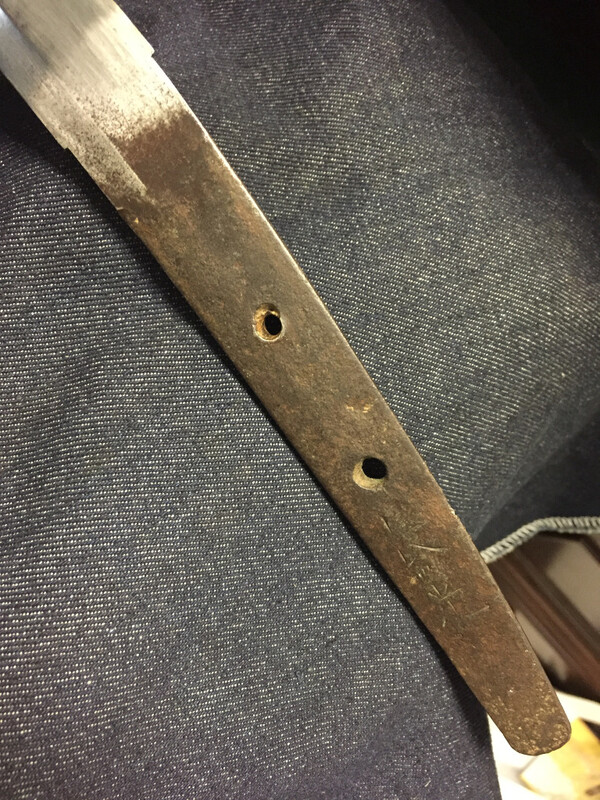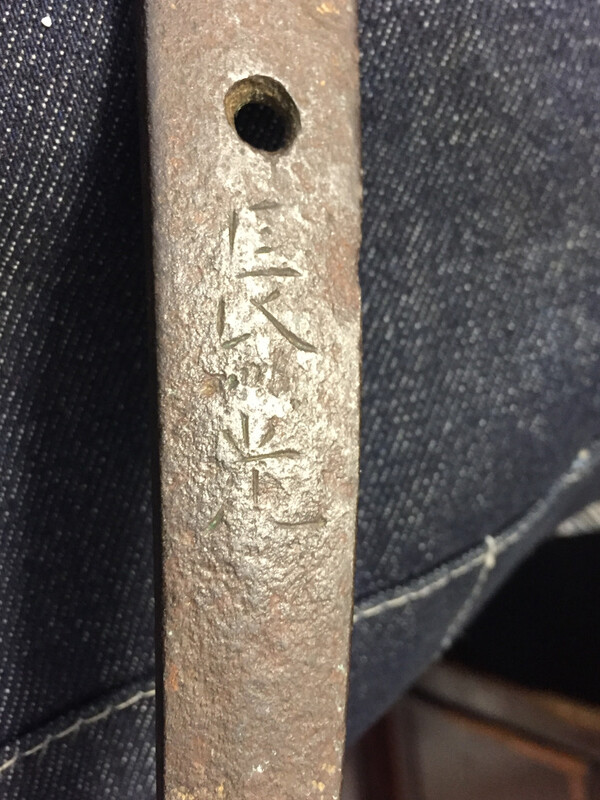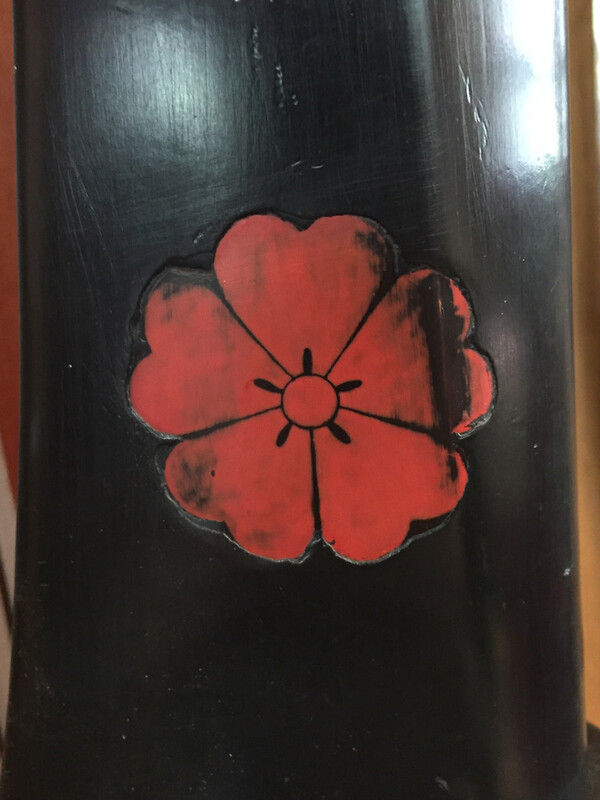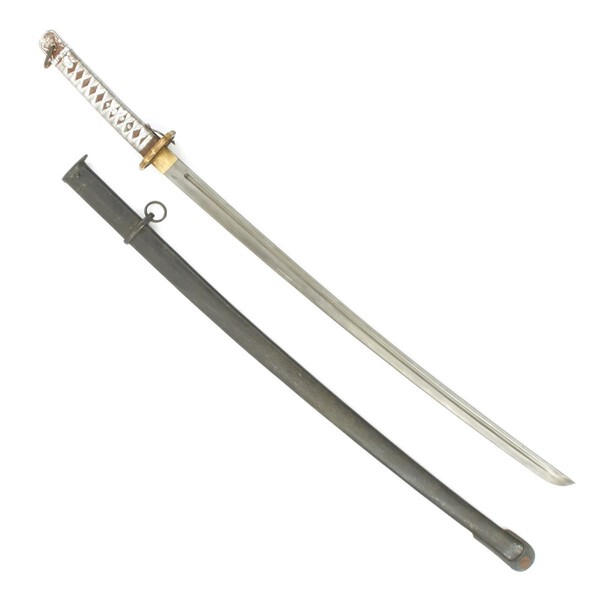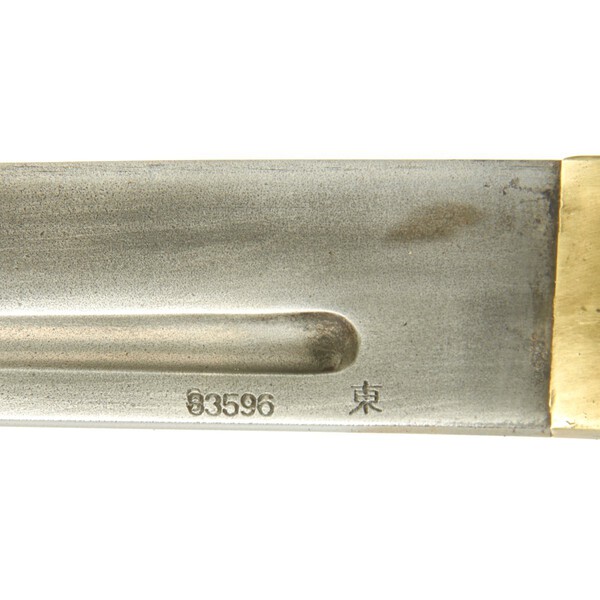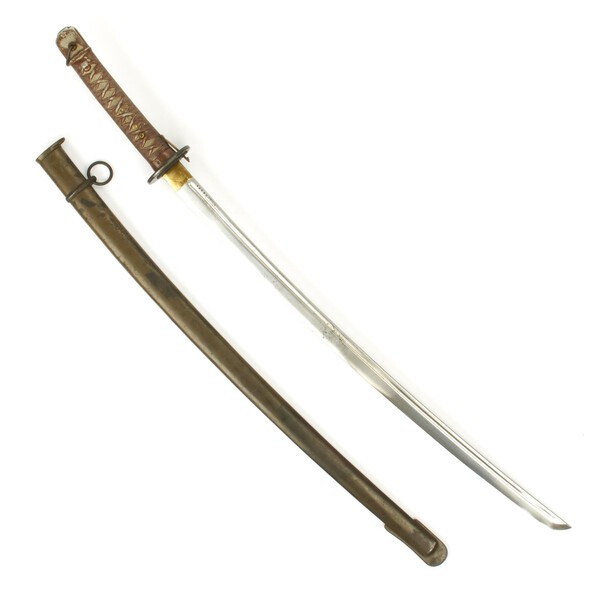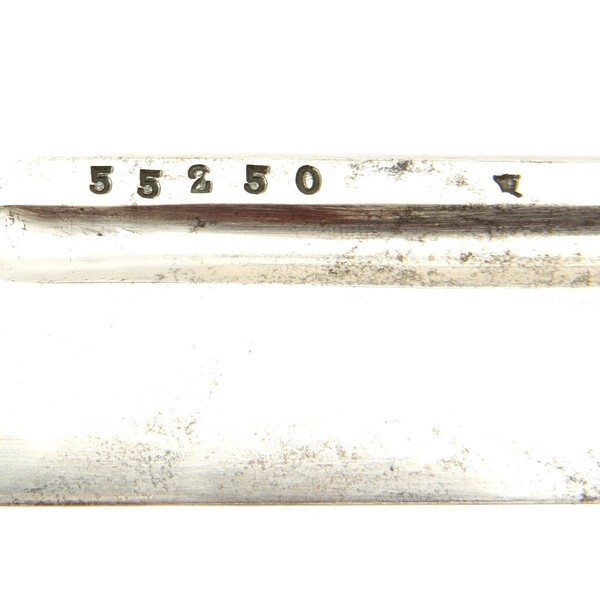
tbonesullivan
Members-
Posts
408 -
Joined
-
Last visited
Content Type
Profiles
Forums
Events
Store
Downloads
Gallery
Everything posted by tbonesullivan
-
It does have a very nice temper line at least. It looks water quenched? Or could that be simulated with acid etching? Is the geometry right for a tanto? Sugata looks like Shobu Zukuri, and, except for the part where someone scratched away rust near the engraving, the polish looks very good.
-
Tachi Sword Tang is signed Nagamitsu - which Nagamitsu is it?
tbonesullivan replied to tbonesullivan's topic in Nihonto
I would hope that the buffing wouldn't be hot enough to get the steel nearly hot enough. But yeah, it's a shame, but at least it was ONLY buffed. We've had some people show us some blades that they had taken to have "sharpened" by people who put new edges on Chef's knives and scissors. I have to sit there hiding my horror as they talk it up like they just had their car detailed. Even if it's a standard Arsenal forced Shin-gunto, that's still hard to look at. -
Help with blade, tassel and fittings
tbonesullivan replied to Michaelr's topic in Military Swords of Japan
Oh wow! That's really nice! I've seen a lot of gunto like that, with the painted numbers ( 四 九) on the blade, and western numbers (4 9) on the koshirae. Nice hamon on the blade. Good Boshi and Yokote as well. Is it probably oil tempered, or water? I don't really see any grain in the blade so I guess arsenal forged? -
Tachi Sword Tang is signed Nagamitsu - which Nagamitsu is it?
tbonesullivan replied to tbonesullivan's topic in Nihonto
Ok, here are some close up pictures of the Kissaki, blade, and both sides of the Nakago. Also a picture of the blade in the handle it came in. If whoever buffed the blade went after the nakago, that could explain why it seems shiny in that area. -
Tachi Sword Tang is signed Nagamitsu - which Nagamitsu is it?
tbonesullivan replied to tbonesullivan's topic in Nihonto
Let me go see if I can get some better pictures. The NAKAGO definitely has significant age to it, and the holes are definitely punched. It just has that look. I'll look on the blade to see if I can see any HADA, Kizu, etc. Without a good polish those can be hard to make out. Now back to writing up a type 32 Gunto. -
I guess this is one of those things that is at the crux of Nihonto collecting. It's what looks to be a very old blade, and the tang is signed Naga Mitsu 長光, in fairly large kanji. They are somewhat faint, but I'm certain on the name. I looked at the Nihonto club listing, and there are a whole bunch of smiths using that same marking, and it's only a two character mei. The SUGATA is SHOBU ZUKURI from what I can see, and is lighter and has the typical thinner tip of a Tachi. It is also signed on the correct side of the blade for being worn edge down. The polish, sadly, is poor, and someone definitely used a buffing wheel on it a bit, so I can't discern any type of hamon.
-
In the last picture of the blade you posted, it looks like there is a WARE in the SHINOGI. Is it a lamination split, or just a scratch?
-
Sakura... I should have known to look for that. Thanks Malcolm! Is there any particular clan who uses that Kamon, or is just a pretty standard military marking?
-
"Sport / Utility Knife" always helps. Antique brush clearing tool. Antique decorative wall hanger.
-
Ahh. Yeah your problem will only be in the Japan end. As long as it's not a CITES controlled wood, the US doesn't really care about edged weapons. I don't know what carriers they have over there, but I would think most of them would have no issues shipping and edged weapon. I will admit that almost my entire experience is shipping FROM the U.S., not to it, except from the United Kingdom.
-
What country is it being shipped to?
-
contact for FEDEX in australia
tbonesullivan replied to lonely panet's topic in Auctions and Online Sales or Sellers
We don't use DHL at all. They didn't want to even touch antique firearms. UPS however we received International Special Commodities contracts for Antique Swords and Antique firearms to most of the European countries where we send things, particularly the United Kingdom. The problem is the routing of UPS when going to Australia and New Zealand, as probably South Africa. They go through Pakistan (I think), who won't allow the antique guns through. U S Mail routes their packages through Dubai in the UAE, so they won't allow them either, and also don't like swords sometimes. If we're shipping things like antique firearms or swords to Australia and New Zealand, it's gotta go Fedex. -
Just had a chance to examine this sword, and it definitely does look nice. Though, the polish is definitely not what it used to be. It looks like it does have a very active Hamon, and having dealt mostly with wartime production, it's nice to see an older blade. Though question is always, would it be worth it to get it a better polish. I'm fairly certain regarding the mei, after comparing it to this example: http://nihontocraft.com/Tango_no_Kami_Jumyo_Katana.htm . It also has a similar habaki. Looks like somewhere along the line one of the SEPPA for the Shin-Gunto KOSHIRAE went missing, as the TSUBA is loose, but the TSUKA fits quite nicely. Just thought I'd share, and maybe get some thoughts. The Hamon is faint, but almost looks like a YAHAZA "Notched" shape.
-
Sure! It's a fairly simple mon, and I think I've seen it a few times in google searches, but my Japanese is not very good. It's a five petaled flower, on the sheath of a naginata. it looks like a Kikyo, but the petal ends go inwards and not outwards. Is it a cherry blossom?
-
Is there any listing out there of more "simple" mon? Also how important is a circle around the design into identifying the mon?
-
Well, I'm only partly blind after staring at the screen and kanji lists, so that's a good thing. It's a katana, 27 3/4 inch blade, fair polish, with a semi visible HAMON. Date and signature are somewhat faded, but this is what I came up with. Signature: BI SHU OSA? FUNE? HISA MITSU. 備 州 長? 船 ? 久 光 Date: Dai-ei Era Second year: 1522 8th month : 大永 二 年 八 月 I found a listing for a Bishi Osafune Hisamitsu https://nihontoclub.com/smiths/HIS59 I am going to assume this is the correct smith, though I'm really iffy on one of those kanji. However, the date is exactly what it should be for that smith. I'm getting slightly better with the simple kanji.
- 1 reply
-
- 1
-

-
WAS THIS SWORD ( BLADE) MADE BEFORE 1921
tbonesullivan replied to karagoz's topic in Translation Assistance
Pretty sure that second character is not any of the "masa" ones used on sword tangs. Maybe 兼専 Kane yoshi? 兼常 Kane tsune ? 兼玄 Kane haru ? -
contact for FEDEX in australia
tbonesullivan replied to lonely panet's topic in Auctions and Online Sales or Sellers
Who shipped the item to you? Was it properly declared on the customs forms as an antique over 100 years in age? This would require use of the Harmonized Tariff code 9706.00.00.60 , which is for antiques over 100 years in age, "other". If it wasn't declared properly, that can always lead to issues. -
This, on the other hand, is definitely a fake. Note the fake age on the blade, the black paint on the scabbard, and the blade markings that look engraved, not stamped.
-
This is a picture of a real Type 95 NCO sword, with a close up of the markings on the blade. Note the scabbard color, as well as the distance the hanger ring is from the mouth of the scabbard. Also, the tang will have two holes, a large and a small. If the tang only has one hole, it's a fake.
-
Gunto pedigree ID requested
tbonesullivan replied to Sea King 11's topic in Military Swords of Japan
Looks nice!!! That is a great Kamon too. Usually the ones I have seen on Gunto were mostly "Maruni Chigai Takanoha" which was used by the Asano and Outani clans, and others. -
Someone brought a katana to me yesterday, and it had a mei, but it was all wrong, the tang was wrong, and of course the "damascus" blade told me all I needed to know before I even looked at the tang. Thankfully there is so much about Japanese swords that simply cannot be faked.
-
Oh nice! I handled a sword by KANEUJI that was dated Showa 16. It also had an arsenal stamp, and another stamp on the end of the tang. Pictures attached for reference.
-
Partial capture tag translation please?
tbonesullivan replied to Logan09's topic in Translation Assistance
Oh wow. Good luck! That's definitely beyond my ability to see. Maybe some digital enhancement could help bring out more of the Kanji.



